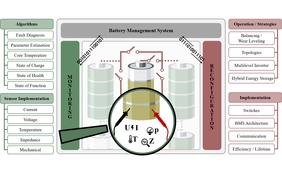Intelligent battery systems can make vehicle battery systems more efficient and future-oriented for coming generations of electric vehicles. The research group has been working on this topic for several years in a joint project with Audi and has published the review article Critical Review of Intelligent Battery Systems: Challenges, Implementation, and Potential for Electric Vehicles in the journal Energies.
For the review, members of our team from the areas of software, hardware, thermodynamics, measurement technology and intelligent functions concentrated their knowledge. On the one hand, the review presents the state of the art for in-vehicle applicability, and on the other hand, it provides a critical assessment of the perspective and feasibility of the many aspects in intelligent battery systems. Batteries are described as intelligent if they include supplementary sensor technology, extended monitoring functions at cell level or switches for reversible modification of the system topology. For the advanced monitoring functions, methods from the field of adaptive systems are often used. Novel management functions, such as fault diagnosis, online parameter estimation and impedance spectroscopy are enabled. In addition, the review focuses on reconfiguration as an essential difference to conventional systems, with aspects such as multi-level inverters and hybrid storage.


![[Translate to English:] Logo Akkreditierungsrat: Systemakkreditiert](/fileadmin/_processed_/2/8/csm_AR-Siegel_Systemakkreditierung_bc4ea3377d.webp)








![[Translate to English:] Logo IHK Ausbildungsbetrieb 2023](/fileadmin/_processed_/6/0/csm_IHK_Ausbildungsbetrieb_digital_2023_6850f47537.webp)


